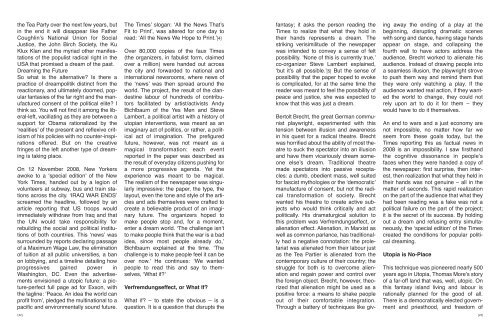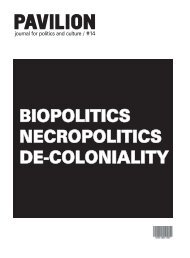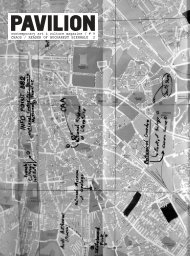Download pdf version of issue no. 16 (4 Mb) - Pavilion
Download pdf version of issue no. 16 (4 Mb) - Pavilion
Download pdf version of issue no. 16 (4 Mb) - Pavilion
You also want an ePaper? Increase the reach of your titles
YUMPU automatically turns print PDFs into web optimized ePapers that Google loves.
the Tea Party over the next few years, but<br />
in the end it will disappear like Father<br />
Coughlin’s National Union for Social<br />
Justice, the John Birch Society, the Ku<br />
Klux Klan and the myriad other manifestations<br />
<strong>of</strong> the populist radical right in the<br />
USA that promised a dream <strong>of</strong> the past.<br />
Dreaming the Future<br />
So what is the alternative? Is there a<br />
practice <strong>of</strong> dreampolitik distinct from the<br />
reactionary, and ultimately doomed, popular<br />
fantasies <strong>of</strong> the far right and the manufactured<br />
consent <strong>of</strong> the political elite? I<br />
think so. You will <strong>no</strong>t find it among the liberal-left,<br />
vacillating as they are between a<br />
support for Obama rationalized by the<br />
‘realities’ <strong>of</strong> the present and reflexive criticism<br />
<strong>of</strong> his policies with <strong>no</strong> counter-inspirations<br />
<strong>of</strong>fered. But on the creative<br />
fringes <strong>of</strong> the left a<strong>no</strong>ther type <strong>of</strong> dreaming<br />
is taking place.<br />
On 12 November 2008, New Yorkers<br />
awoke to a ‘special edition’ <strong>of</strong> the New<br />
York Times, handed out by a legion <strong>of</strong><br />
volunteers at subway, bus and train stations<br />
across the city. ‘IRAQ WAR ENDS’<br />
screamed the headline, followed by an<br />
article reporting that US troops would<br />
immediately withdraw from Iraq and that<br />
the UN would take responsibility for<br />
rebuilding the social and political institutions<br />
<strong>of</strong> both countries. This ‘news’ was<br />
surrounded by reports declaring passage<br />
<strong>of</strong> a Maximum Wage Law, the elimination<br />
<strong>of</strong> tuition at all public universities, a ban<br />
on lobbying, and a timeline detailing how<br />
progressives gained power in<br />
Washington, DC. Even the advertisements<br />
envisioned a utopic future: a picture-perfect<br />
full page ad for Exxon, with<br />
the tagline: ‘Peace. An idea the world can<br />
pr<strong>of</strong>it from’, pledged the multinational to a<br />
pacific and environmentally sound future.<br />
[22]<br />
The Times’ slogan: ‘All the News That’s<br />
Fit to Print’, was altered for one day to<br />
read: ‘All the News We Hope to Print.’[4]<br />
Over 80,000 copies <strong>of</strong> the faux Times<br />
(the organizers, in fabulist form, claimed<br />
over a million) were handed out across<br />
the city and forwarded to national and<br />
international newsrooms, where news <strong>of</strong><br />
the ‘news’ was then spread around the<br />
world. The project, the result <strong>of</strong> the clandestine<br />
labour <strong>of</strong> hundreds <strong>of</strong> contributors<br />
facilitated by artist/activists Andy<br />
Bichlbaum <strong>of</strong> the Yes Men and Steve<br />
Lambert, a political artist with a history <strong>of</strong><br />
utopian interventions, was meant as an<br />
imaginary act <strong>of</strong> politics, or rather, a political<br />
act <strong>of</strong> imagination. The prefigured<br />
future, however, was <strong>no</strong>t meant as a<br />
magical transformation: each event<br />
reported in the paper was described as<br />
the result <strong>of</strong> everyday citizens pushing for<br />
a more progressive agenda. Yet the<br />
experience was meant to be magical.<br />
The realism <strong>of</strong> the newspaper was singularly<br />
impressive: the paper, the type, the<br />
layout, even the tone and style <strong>of</strong> the articles<br />
and ads themselves were crafted to<br />
create a believable product <strong>of</strong> an imaginary<br />
future. The organizers hoped to<br />
make people stop and, for a moment,<br />
enter a dream world. ‘The challenge isn’t<br />
to make people think that the war is a bad<br />
idea, since most people already do,’<br />
Bichlbaum explained at the time. ‘The<br />
challenge is to make people feel it can be<br />
over <strong>no</strong>w.’ He continues: ‘We wanted<br />
people to read this and say to themselves,<br />
‘What if?’<br />
Verfremdungseffect, or What If?<br />
What if? – to state the obvious – is a<br />
question. It is a question that disrupts the<br />
fantasy; it asks the person reading the<br />
Times to realize that what they hold in<br />
their hands represents a dream. The<br />
striking verisimilitude <strong>of</strong> the newspaper<br />
was intended to convey a sense <strong>of</strong> felt<br />
possibility. ‘None <strong>of</strong> this is currently true,’<br />
co-organizer Steve Lambert explained,<br />
‘but it’s all possible.’[5] But the sense <strong>of</strong><br />
possibility that the paper hoped to evoke<br />
is complicated, for at the same time the<br />
reader was meant to feel the possibility <strong>of</strong><br />
peace and justice, she was expected to<br />
k<strong>no</strong>w that this was just a dream.<br />
Bertolt Brecht, the great German communist<br />
playwright, experimented with this<br />
tension between illusion and awareness<br />
in his quest for a radical theatre. Brecht<br />
was horrified about the ability <strong>of</strong> most theatre<br />
to suck the spectator into an illusion<br />
and have them vicariously dream someone<br />
else’s dream. Traditional theatre<br />
made spectators into passive receptacles:<br />
a dumb, obedient mass, well suited<br />
for fascist mythologies or the ‘democratic’<br />
manufacture <strong>of</strong> consent, but <strong>no</strong>t the radical<br />
transformation <strong>of</strong> society. Brecht<br />
wanted his theatre to create active subjects<br />
who would think critically and act<br />
politically. His dramaturgical solution to<br />
this problem was Verfremdungseffect, or<br />
alienation effect. Alienation, in Marxist as<br />
well as common parlance, has traditionally<br />
had a negative con<strong>no</strong>tation: the proletariat<br />
was alienated from their labour just<br />
as the Tea Partier is alienated from the<br />
contemporary culture <strong>of</strong> their country; the<br />
struggle for both is to overcome alienation<br />
and regain power and control over<br />
the foreign object. Brecht, however, theorized<br />
that alienation might be used as a<br />
positive force: a means to shake people<br />
out <strong>of</strong> their comfortable integration.<br />
Through a battery <strong>of</strong> techniques like giv-<br />
ing away the ending <strong>of</strong> a play at the<br />
beginning, disrupting dramatic scenes<br />
with song and dance, having stage hands<br />
appear on stage, and collapsing the<br />
fourth wall to have actors address the<br />
audience, Brecht worked to alienate his<br />
audience. Instead <strong>of</strong> drawing people into<br />
a seamless illusion, the playwright strove<br />
to push them way and remind them that<br />
they were only watching a play. If the<br />
audience wanted real action, if they wanted<br />
the world to change, they could <strong>no</strong>t<br />
rely upon art to do it for them – they<br />
would have to do it themselves.<br />
An end to wars and a just eco<strong>no</strong>my are<br />
<strong>no</strong>t impossible, <strong>no</strong> matter how far we<br />
seem from these goals today, but the<br />
Times reporting this as factual news in<br />
2008 is an impossibility. I saw firsthand<br />
the cognitive dissonance in people’s<br />
faces when they were handed a copy <strong>of</strong><br />
the newspaper: first surprise, then interest,<br />
then realization that what they held in<br />
their hands was <strong>no</strong>t genuine – all in the<br />
matter <strong>of</strong> seconds. This rapid realization<br />
on the part <strong>of</strong> the audience that what they<br />
had been reading was a fake was <strong>no</strong>t a<br />
political failure on the part <strong>of</strong> the project;<br />
it is the secret <strong>of</strong> its success. By holding<br />
out a dream and refusing entry simultaneously,<br />
the ‘special edition’ <strong>of</strong> the Times<br />
created the conditions for popular political<br />
dreaming.<br />
Utopia is No-Place<br />
This technique was pioneered nearly 500<br />
years ago in Utopia, Thomas More’s story<br />
<strong>of</strong> a far-<strong>of</strong>f land that was, well, utopic. On<br />
this fantasy island living and labour is<br />
rationally planned for the good <strong>of</strong> all.<br />
There is a democratically elected government<br />
and priesthood, and freedom <strong>of</strong><br />
[23]








